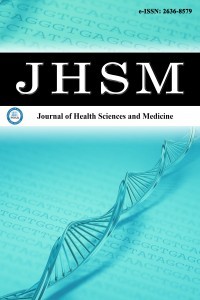1.
Ragusa F, Fallahi P, Elia G, et al. Hashimotos’ thyroiditis:epidemiology, pathogenesis, clinic and therapy. Best Practice ResClin Endocrinol Metab. 2019;33(6):101367.
2.
McLeod DS, Caturegli P, Cooper DS, et al. Variation in rates ofautoim- mune thyroid disease by race/ethnicity in US militarypersonnel. JAMA. 2014;311(15):1563-1565.
3.
Rayman MP. Multiple nutritional factors and thyroid disease,with particular reference to autoimmune thyroid disease. ProcNutr Soc. 2019;78(1):34-44.
4.
Kawicka A, Regulska-Ilow B. Metabolic disorders andnutritional status in autoimmune thyroid diseases. Advances inHygiene & Experimental Medicine/Postepy Higieny i MedycynyDoswiadczalnej. 2015;69:80-90.
5.
Öztekin, Y, Ayaz A. Otoimmün tiroid hastalıklarında Dvitamininin Rolü. İzmir Katip Çelebi Üniversitesi Sağlık BilimleriFakültesi Derg. 2015;7(1):179-184.
6.
Wiersinga WM. Clinical relevance of envi- ronmental factors inthe pathogenesis of au- toimmune thyroid disease. EndocrinolMetab. 2016;31(2):213-222.
7.
Zaletel K, Gaberscek S. Hashimoto's thyroiditis:from genes to thedisease. Curr Genomics. 2011;12(8):576-588.
8.
Aktaş HŞ. Vitamin B12 and Vitamin D levels in patients withautoimmune hypothyroidism and their correlation with anti-thyroid peroxidase antibodies. Med Princ Pract. 2020;29(4);364-370.
9.
Elvira D. The Role of T-Regulatory Expression in AutoimmuneThyroid Disease and its association with Thyroid antibody. JAutoim Disor. 2016;2;2:19.
10.
Krysia R, Szkróbka W, Okopien B. The effect of vitamin D onthyroid autoimmunity in levothyroxine-treated women withHashimoto’s thyroiditis and normal vitamin D status. Exp ClinEndocrinol Diabetes. 2017;125(4):229-233.
11.
Hu S, Rayman MP. Multiple nutritional factors and the risk ofHashimoto's thyroiditis. Thyroid. 2017;27(5):597-610.
12.
Ashraf TS, De Sanctis V, Yassin M, Wagdy M, & Soliman N.Chronic anemia and thyroid function. Acta Bio Medica: AteneiParmensis. 2017;88(1):119.
13.
Koç Ş, Güngör K, Güngör ND, Uzunlulu M. Iron deficiency inwomen with thyroid-specific autoantibodies:a case control study.J Exp Clin Med. 2022;39(1):194-198.
14.
Das P, Dasnayak G, Senapati U. Cytomorphological spectrumof Hashimoto's thyroiditis and its correlatıon with clinicalpresentation, thyroid function test and antibody level. Int J SciRes. 2018;7:2277-2282.
15.
Rosen Y, Daich J, Soliman I, Brathwaite E, Shoenfeld Y. Vitamin Dand autoimmunity. Scand J Rheumatol. 2016;45(6):439-447.
16.
Kivity S, Agmon-Levin N, Zisappl M, et al. Vitamin D andautoimmune thyroid diseases. Cell Mol Immunol. 2011;8(3):243-247.
17.
Unal AD, Tarcin O, Parildar H, et al. Vitamin D deficiency isrelated to thyroid antibodies in autoimmune thyroiditis. Cent EurJ Immunol. 2014;39(4):493-497.
18.
Kim D. The role of vitamin D in thyroid diseases. Int J Mol Sci.2017;18(9):1949.
19.
Mele C, Caputo M, Bisceglia A, et al. Immunomodulatory effectsof vitamin D in thyroid diseases. Nutrients. 2020;12(5):1444.
20.
Rubens M, Ramamoorthy V, Saxena P, et al. Association betweenvitamin D deficiency and hypothyroidism:results from theNational Health and Nutrition Examination Survey (NHANES).2007-2012. BMC Endocr Disord. 2021;21(1):1-9.
21.
Ece A, Sevin F. Exploring QSAR on 4-cyclohexylmethoxypyrimidinesas antitumor agents for their inhibitory activity of cdk2. Letters inDrug Design & Discovery. 2010;7:625-631.
22.
Chan K, Frankish N, Zhang T, et al. Bioactive indanes:insightinto the bioactivity of indane dimers related to the leadanti-inflammatory molecule PH46A. J Pharm Pharmacol.2020;72(7):927-937.
23.
Yamali C, Gul HI, Sakarya M.T, et al. Quinazolinone-basedbenzenesulfonamides with low toxicity and high affinity asmonoamine oxidase-A inhibitors:synthesis, biological evaluationand induced-fit docking studies. Bioor Chem. 2022;124:105822.
24.
Luo X, Zheng T, Mao C, et al. Aberrant MRP14 expression inthyroid follicular cells mediates chemokine secretion throughthe IL-1β/MAPK pathway in Hashimoto’s thyroiditis. EndocrConnect. 2018;7(6):850-858.
25.
Gan XX, Zhong LK, Shen F, et al. Network pharmacology toexplore the molecular mechanisms of prunella vulgaris fortreating Hashimoto’s thyroiditis. Front Pharmacol. 2021:12.
26.
Beyazit Y, Kocak E, Tanoglu A, Kekilli M. Oxidative stress mightplay a role in low serum vitamin D associated liver fibrosis amongpatients with autoimmune hepatitis. Dig Dis Sci. 2015;60(4):1106-1108.

